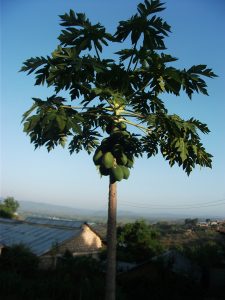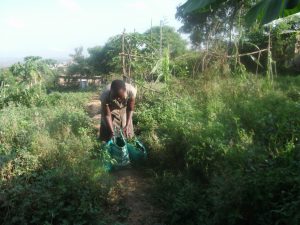Last fall I was interning at an international nonprofit organization in Mombasa, Kenya and staying with a host family. My family consisted of six direct siblings and two loving parents. While some of my siblings were older and lived outside of the home, the three that did live at home were very engaged in the family business of farming. My host parents, both in the retirement age, are farmers on the outskirts of Mombasa County. They grow local produce such as kale, spinach, peppers, eggplant, corn and papaya. They also raise five cows and over 100 chickens.
Every morning my schedule consisted of waking up at 5am to milk the cows in the dark and collect the chicken eggs for sale, all before breakfast. After breakfast I would head out into the “garden,” as my host mother would call it, and pick the day’s vegetables to send off to the market for sale. After returning from my internship in the evening I would once again help milk the cows and head out onto the farm to grab some vegetables for dinner. Almost everything I ate in those three months came from the ground that my family worked.
Though it was my host parents’ dream to start the farm, their children are the number one reason they were able to become successful. In between school and work, my host brother would clean the chicken coops and feed and water the chickens. My two host sisters would sell the milk and eggs at the market and help harvest out on the farm. This was most definitely a family business. After my host parents retire officially, plans have been made to have my older host siblings return home and continue growing the family farm.

Their success was largely based on their community. There was a clear demand for their products in their own neighborhood and business was strong. They sold their products in the local market, within walking distance of the actual farm, and never had to worry about sales and marketing. In their world, internet access and social media had nothing to do with locally grown, organic produce. But things aren’t that simple here at home. Locally grown means downstate or across the town if you’re lucky. It almost never means down the block. And while there is a real demand for healthy food, there is a disconnect between the farmers that grow that food and the customers buying it.
I came to work with The Land Connection because I believe bridging this gap is so important. Being able to connect farmers with customers and the community is a great way to bolster the industry’s sales and creative an environment that is attractive to young farmers and entices them to stay in the family business of growing healthy food for a healthy society.




